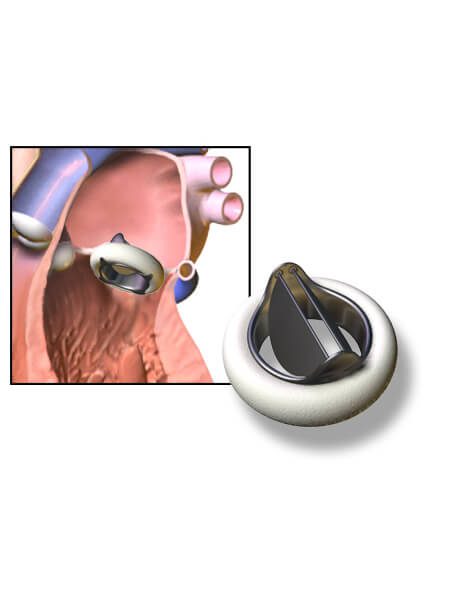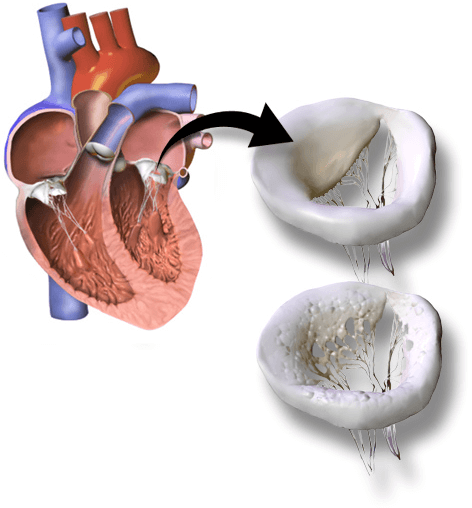How Heart Valve Replacement Works?
Heart valve disease is a common condition that affects millions of people worldwide, including those living in Dubai. We recently wrote a blog post on mitral valve repair or replacement that you might be interested in.
Heart valve disease refers to a condition in which one or more of the heart valves do not function properly, causing problems with blood flow in and out of the heart. If left untreated, heart valve disease can lead to heart failure and other serious complications, which is why medical intervention is required usually in the form of valve repair or replacement.
Defining Heart Valve Disease and Surgery
Fortunately, heart valve surgery is available to treat this condition. Valve replacement is a common form of heart valve surgery that involves removing a faulty valve and replacing it with a new one.
The surgery may be performed using a heart-lung bypass machine, which takes over the functions of the heart and lungs during the procedure.

There are two main types of heart valves: the aortic valve and the mitral valve. Aortic valve replacement surgery is more common than mitral valve replacement surgery, as the aortic valve is more likely to develop problems.
In recent years, minimally invasive heart surgery has become an increasingly popular option for valve replacement. This technique involves making smaller incisions than traditional open-heart surgery and can result in a quicker recovery time and less scarring.
Types of Heart Valve Replacement Surgery
There are two types of heart valve replacements: mechanical and biological.

Mechanical Valve Replacement
Mechanical valve replacement was first introduced in the 1960s and quickly became the preferred option for valve replacement surgery due to their durability and longevity.
The first successful mechanical valve replacement was performed by Dr. Albert Starr and engineer Lowell Edwards in 1960. Mechanical valves are made of durable materials such as metal or ceramic and are designed to last a lifetime. They offer excellent blood flow and are less likely to develop blood clots than biological valves.
However, mechanical valves carry a higher risk of complications such as bleeding and infections and require lifelong anticoagulant therapy to prevent blood clots. Mechanical heart valves are still commonly used today, particularly in younger patients who require a long-lasting replacement valve.
MEET OUR CARDIOLOGY TEAM
- All
- Cardiac Surgery
- Cardiology
Biological Valve Replacement
Biological valve replacement, also known as tissue valves, are made from various animals' tissue such as the pericardium or heart valves. They have been in use since the 1960s and were initially developed as an alternative to mechanical heart valves.
Biological heart valves do not require long-term anticoagulation therapy, which is necessary for patients with mechanical heart valves.
This type of heart valve replacement is also less likely to cause blood clots and justify a lower risk of infection. However, they have a shorter lifespan compared to mechanical heart valves and may need to be replaced after 10 to 15 years.

Other Types of Valve Replacement
Another type of heart valve replacement is transcatheter aortic valve implantation (TAVI), which is a minimally invasive procedure that does not require open-heart surgery.
TAVI involves inserting a new valve through a small incision in the leg and threading it up to the heart.
Overview of Heart Valve Replacement Surgery
Heart valve replacement surgery is a complex and sophisticated medical procedure designed to repair or replace a damaged or malfunctioning heart valve.
The heart's valves are responsible for regulating blood flow within the heart, and when they do not function properly, it can result in heart valve disease. This condition can be caused by several factors, including congenital heart defects, infections, age-related wear and tear, and more.
If left untreated, heart valve disease can lead to a host of complications, including heart failure, blood clots, and stroke.
What are Heart Valves Role in the Circulatory System?
The heart valves are vital components of the circulatory system, responsible for regulating the flow of blood through the heart's chambers.
The heart consists of four chambers - two atria and two ventricles - and each of these chambers has a one-way valve that ensures blood flows in the correct direction. The right atrium and ventricle are responsible for pumping deoxygenated blood to the lungs, while the left atrium and ventricle are responsible for pumping oxygenated blood to the rest of the body.
The heart valves play a crucial role in this process, opening and closing at specific times to ensure that blood flows smoothly through the heart.
Reasons Why a Heart Valve May Need to be Replaced
There are several reasons why a heart valve may need to be replaced, including congenital heart defects, infections, and age-related wear and tear.
The most common conditions that require valve replacement are aortic valve stenosis and aortic valve regurgitation.
Aortic valve stenosis occurs when the aortic valve becomes narrow, reducing blood flow from the heart to the rest of the body. Aortic valve regurgitation, on the other hand, occurs when the valve doesn't close properly, allowing blood to flow back into the heart. These conditions may require intervention such as aortic valve replacement or repairing the aortic valve.
Preparing for Heart Valve Replacement Surgery
When preparing for heart valve surgery for both valve repair or replacement, patients will typically undergo a series of pre-operative appointments, evaluations, and tests. These appointments are designed to ensure that patients are in good health and ready for surgery.
During these appointments, the surgical team will evaluate the patient's medical history, perform a physical exam, and run a battery of tests to check the patient's overall health.
One of the most important aspects of preparing for heart valve surgery is providing a complete medical history to the surgical team.
This includes information about any medical conditions the patient may have, as well as any medications or supplements they are taking. It is also important to provide information about any previous surgeries or procedures the patient has undergone.
Patients will also need to make certain lifestyle changes leading up to the surgery. This may include adjusting their diet, stopping certain medications or supplements, and engaging in light exercise to build strength and endurance. It is important to follow these instructions carefully to ensure that the surgery is successful.
The Heart Valve Replacement Procedure
Heart valve replacement surgery is a complex and delicate procedure that requires careful planning and execution.
The surgery typically takes place in the intensive care unit of a hospital and over several hours to complete and is performed under general anesthesia.
The first step in the heart valve replacement procedure is to make an incision in the patient's chest to access the heart. The surgical team will then use a heart lung bypass machine to take over the function of the patient's heart and lungs. This allows the surgical team to stop the heart and perform the surgery without causing harm to the patient.
Once the heart is stopped, the surgical team will remove the damaged valve and replace it with a new one. There are several types of heart valves that may be used, including mechanical and biological valves. The choice of valve will depend on several factors, including the patient's age, overall health, and the location and severity of the valve damage.
There are different surgical approaches that may be used for heart valve replacement surgery. Traditional open-heart surgery involves making a large incision in the chest to access the heart.
Minimally invasive procedures, on the other hand, involve making smaller incisions and using specialized instruments to perform the surgery. The choice of approach will depend on several factors, including the patient's overall health and the location and severity of the valve damage.
As with any surgery, heart valve replacement comes with potential complications and risks. These may include bleeding, infection, blood clots, and stroke.
The surgical team will take all necessary precautions to minimize these risks and ensure that the surgery is as safe as possible for the patient.
Life After Heart Valve Replacement Surgery
Lifestyle Changes After Heart Valve Replacement Surgery
After heart valve replacement surgery, patients may need to make lifestyle changes to improve their overall health and reduce the risk of future heart problems.
This can include adopting a heart-healthy diet rich in fruits, vegetables, whole grains, and lean proteins. Patients may also be advised to limit their sodium and saturated fat intake.
Exercise is also important and can improve cardiovascular health, promote weight loss, and reduce stress. Patients should consult with their doctor before starting any exercise program and develop an exercise plan that works for their individual needs.
Long-Term Outcomes After Heart Valve Replacement Surgery
The long-term outcomes after heart valve replacement surgery are generally positive. The surgery can improve heart function, reduce symptoms, and increase life expectancy.
Patients can expect to see an improvement in their quality of life, with more energy and less shortness of breath.
Potential Complications After Surgery
While heart valve replacement surgery is generally safe, there is a risk of potential complications. These can include infections, blood clots, or bleeding. Patients should closely monitor their incision site for signs of infection, such as redness, swelling, or discharge.
Patients should also be aware of symptoms of blood clots, such as chest pain or shortness of breath, and seek medical attention immediately if they experience these symptoms.
Maintaining Heart Health After Surgery
After heart valve replacement surgery, patients should continue to maintain their heart health through regular check-ups, healthy lifestyle habits, and taking prescribed medications as directed.
Patients may need to take blood thinners or other medications to prevent blood clots, reduce blood pressure, or manage cholesterol levels.
Patients should continue to monitor their weight, blood pressure, and overall health and seek medical attention if any new symptoms arise.
How Family Can Help with Life After Heart Valve Replacement
Support from family and loved ones can be an important part of recovery after heart valve replacement surgery.
Family members can help with daily activities such as cooking, cleaning, and running errands, they can offer emotional support and encouragement during the recovery process. Family members should also encourage patients to attend follow-up appointments and take prescribed medications as directed.
Active Monitoring of Blood Pressure
Active monitoring of blood pressure is recommended after heart valve replacement surgery to ensure that blood pressure levels remain within a healthy range.
Active monitoring can be done through traditional methods such as regular blood pressure checks at a doctor's office, or through the use of approved blood pressure monitors or even wearable technology such as a smartwatch or fitness tracker. Patients should consult with their doctor to determine the best method for monitoring blood pressure after surgery.
